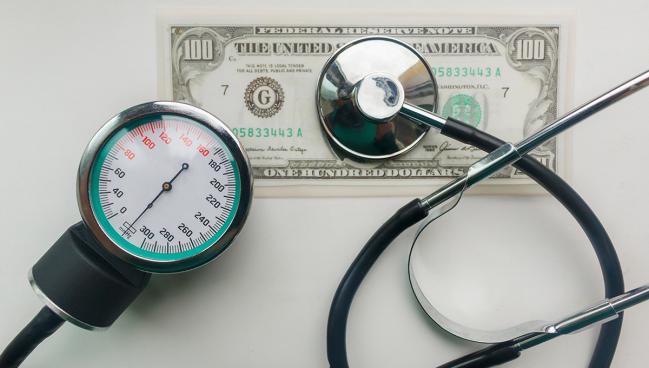Reimbursement Issues Seem to Be Holding Renal Denervation Back
Many centers are not yet performing the procedure, but some financial relief is on the way in the new year.

It’s been over a year since renal denervation systems for the treatment of hypertension became available to US physicians, but uptake has been spotty as centers try to figure out how to cover the costs of the procedure, according to physicians interviewed by TCTMD.
The ultrasound-based Paradise system (Recor Medical) was the first to gain approval by the US Food and Drug Administration in November 2023, with the Symplicity Spyral system (Medtronic) getting the thumbs up just a few weeks later. Several professional groups have weighed in on use of the procedure in the past few years—including the Society for Cardiovascular Angiography and Interventions, the American Heart Association (AHA), and multiple European societies—and agree that renal denervation should play some role in the clinical management of hypertension.
For now, however, economic considerations seem to be standing in the way.
“Everybody’s poised at the starting line, ready to begin treating patients, but the absence of reimbursement has really been a stumbling block,” said David Kandzari, MD (Piedmont Heart Institute, Atlanta, GA), whose research has indicated that renal denervation is cost-effective. He told TCTMD that at his center, his team has been prioritizing enrolling patients into the SPYRAL AFFIRM “perimarket” surveillance study when they meet enrollment criteria.
“But there are still others who don’t, and for those patients, we have performed cases without reimbursement, working with our hospital administration to find an acceptable finite limit of cases that we can perform,” he said.
Ajay Kirtane, MD (NewYork-Presbyterian/Columbia University Irving Medical Center, New York, NY), said, “We’ve been able to treat patients that needed it. But at present, it’s very, very difficult to get any reimbursement. And I think the challenge is not just the cost of the device, it’s the overall procedural costs as well.”
Changes in reimbursement from the US Centers for Medicare & Medicaid Services that will take effect on January 1, 2025, may help. In August, CMS approved new technology add-on payments for both approved renal denervation systems under the Medicare Hospital Inpatient Prospective Payment System. This added payment will be a maximum of $14,950 for the Paradise system and $10,400 for the Symplicity Spyral system (figures that equal 65% of the average cost per case for hospitals).
Then, last month, CMS approved transitional pass-through payments for both technologies under the 2025 Medical Hospital Outpatient Prospective Payment System, a move welcomed by both Recor Medical and Medtronic. These payments can last for up to 3 years.
This has created an incredible strain in hospitals performing these procedures because the hospitals are set to lose thousands and thousands of dollars for these cases. David Kandzari
Whether that will be enough to ease the financial crunch for centers is unclear. Beyond renal denervation, the field of interventional cardiology has multiple other novel technologies that have FDA approval without corresponding reimbursement, Kandzari noted, pointing to the Agent coronary drug-coated balloon (Boston Scientific) for in-stent restenosis, the Evoque device (Edwards Lifesciences) for transcatheter tricuspid valve replacement, and the TriClip device (Abbott) for transcatheter edge-to-edge repair of tricuspid regurgitation.
“This has created an incredible strain in hospitals performing these procedures because the hospitals are set to lose thousands and thousands of dollars for these cases,” he said, adding that this has led to centers setting limits on how many of these procedures can be done.
“The expectation is that once the transitional pass-through payment goes through . . . hospitals will hopefully be able to at least break even, if not find some modest contribution margin from the procedure,” Kandzari said, predicting an uptick in use of renal denervation. “But ultimately it will be when we get a national coverage decision, and then when we get [Category I] CPT codes associated with this, that I think things will be in place for doing renal denervation on a more routine basis.”
Of note, the American Medical Association’s CPT Editorial Panel rejected two new codes for renal denervation at its September meeting, tabling the issue until 2025. That was a consequence, Kandzari said, of a lack of consensus at the meeting among the various stakeholders—including the device manufacturers and professional societies—on a definition that would be proposed for coding.
Though the transitional pass-through payments are likely to help starting in the new year, Kirtane noted that such payments typically apply to Medicare patients who are 65 or older, whereas the mean age of patients in the renal denervation trials was about 55.
“It will take time for other payers to follow suit,” he said. “You would think that payers would recognize it for at-risk patients with uncontrolled hypertension—that’s a real public health issue for them—and so they would approve these cases. I don’t expect them to approve them indiscriminately, but [instead use] some process such that the right patients still have access to treatment.”
The Right Patients
Jordana Cohen, MD (Hospital of the University of Pennsylvania, Philadelphia), who described herself as “a little bit of a skeptic” when it comes to renal denervation, highlighted the importance of appropriate patient selection when rolling out the procedure. She noted that in the randomized trials performed over the past several years, roughly two-thirds of patients had a reduction in blood pressure following denervation, while the rest didn’t.
After renal denervation was approved for use in the US, Cohen said, “I was worried that it was going to just be very, very quickly widely adopted by a lot of places that don’t necessarily have the expertise to do it since the trials seem to show that, at least historically, it was operator-dependent, meaning you needed to have done a lot of them to do well with them.”
But she was also concerned that the procedure would be used in patients who had not gotten a sufficient workup. “It’s not going to work for people who, for instance, have other causes of hypertension that would be targeted by other specific treatments,” said Cohen. “And it’s going to be problematic in people, for example, who think it’s a fix of their entire hypertension and see it as an opportunity to stop medication, which may not be appropriate for them. And so I worry about that.”
So far, however, “people are . . . being appropriately skeptical, appropriately cautious,” Cohen said. “There’s been a lot of effort to educate people on the importance of screening people for secondary hypertension before doing it. . . . So I’m a little more optimistic than I was, but I’m still concerned about it being overused in the wrong patients. I think the people who will benefit most are the people who really, really struggle with the idea of being on medication or who have really severe side effects from medication and can’t tolerate them.”
I’m a little more optimistic than I was, but I’m still concerned about it being overused in the wrong patients. Jordana Cohen
Wanpen Vongpatanasin, MD (UT Southwestern Medical Center, Dallas, TX), who sits on the leadership committee of the AHA’s Council on Hypertension and was an author of the recent AHA scientific statement on the procedure, said that there are still some misconceptions about which patients are eligible for renal denervation. “Oftentimes, we get referred by a patient who’s on dialysis, for example, and this is not really a patient that has been studied in a clinical trial [and is one] unlikely to benefit from the procedure,” she explained.
Moreover, referred patients often haven’t had their antihypertensive drugs adjusted to what would be considered optimal medical therapy, she said.
Even so, there are likely patients who will benefit from renal denervation, Vongpatanasin indicated. When considering the procedure, clinicians should make sure patients have characteristics similar to those of participants who derived benefit in the randomized trials, she advised, noting that most of the trials included patients with combined systolic and diastolic hypertension and excluded those severe impairment in kidney function.
I think it will benefit a subgroup of people who have . . . combined systolic, diastolic hypertension and who have side effects to multiple medications that prevented them from getting blood pressure under control. Wanpen Vongpatanasin
Primary aldosteronism may be present in up to 20% of patients with resistant hypertension, she noted. “Aldosterone excess can promote cardiorenal issues that are independent of blood pressure, and just treating with renal denervation alone probably doesn’t solve the underlying problem,” she said, adding that there could be a “missed opportunity if the hypertension is driven by an adrenal tumor. . . . I think taking it out can substantially improve blood pressure and, in some cases, even cure hypertension.”
Ultimately, Vongpatanasin said, “I think it will benefit a subgroup of people who have . . . combined systolic, diastolic hypertension and who have side effects to multiple medications that prevented them from getting blood pressure under control. I think those are the patients who we don’t have good treatment for because they cannot tolerate conventional medical therapy.”
Moving Forward
Kandzari said he’s hopeful that CMS will release a national coverage decision for renal denervation within the next few months, adding that it’s unclear when the CPT Editorial Panel will review potential procedural codes again in the new year. He expects new codes to be approved, but those still wouldn’t go into effect until the following year.
In the meantime, the transitional pass-through payments should be a salve, he indicated. “At least it should not be a money-losing endeavor. And I think at that point, I believe that the inflection point should start to increase considerably for the performance of this procedure.”
Like any technology, there’s often an overexuberant adoption of it, and especially for a technology that’s not cheap, that would really not be in the best interest of the general population. Ajay Kirtane
Kirtane expressed frustration about the limitations imposed by the lack of reimbursement for renal denervation, but predicted that use would steadily increase over the next few years. He suggested that it would make sense to apply the procedure before hypertension-related complications crop up.
“The time to treat hypertension is earlier in life, because that’s before end-organ issues and events start occurring,” he said, noting that “right now, most people, because we’re trying to be rational in our use, are treating the highest-risk patients. But you don’t want to only be treating patients that have had events.”
It would require commercial payers to start reimbursing renal denervation to facilitate that earlier treatment, he indicated.
“I don’t think an insurance company should approve renal denervation for folks who have not tried medications. That’s not what we’re talking about,” he said. “But for folks that have really tried their best and they still have blood pressures in the 160s, this shouldn’t be something where it takes 2, 3 years for these determinations to take place. I would hope that these companies would very quickly at least adopt some process other than just saying no.”
Kirtane underscored the need for a judicious rollout moving forward. “We just have to, as clinicians, as payers, as patients, as hospital systems, make sure that its use is for the right patients. That’s the only thing I really want to emphasize, because, like any technology, there’s often an overexuberant adoption of it, and especially for a technology that’s not cheap, that would really not be in the best interest of the general population. So we have to be respectful and rational in terms of how we deploy it.”
Todd Neale is the Associate News Editor for TCTMD and a Senior Medical Journalist. He got his start in journalism at …
Read Full BioDisclosures
- Kandzari reports institutional/research grant support from Ablative Solutions and Medtronic and personal consulting honoraria from Ablative Solutions, Medtronic, DeepQure, and Golden Leaf Medical.
- Kirtane reports institutional funding to Columbia University and/or the Cardiovascular Research Foundation from Medtronic, Boston Scientific, Abbott Vascular, Amgen, CathWorks, Concept Medical, Philips, Recor Medical, Neurotronic, Biotronik, Chiesi, Bolt Medical, Magenta Medical, SoniVie, and Shockwave Medical. In addition to research grants, institutional funding includes fees paid to Columbia University and/or the Cardiovascular Research Foundation for consulting and/or speaking engagements in which Kirtane controlled the content. He also reports equity options in Bolt Medical and Airiver and travel expenses/meals from Amgen, Medtronic, Biotronik, Boston Scientific, Abbott Vascular, CathWorks, Concept Medical, Novartis, Philips, Abiomed, Recor Medical, Chiesi, Zoll, Shockwave, and Regeneron.
- Cohen and Vongpatanasin report no relevant conflicts of interest.





Comments